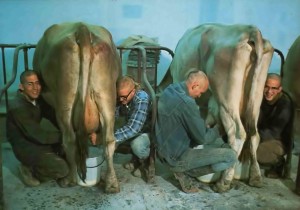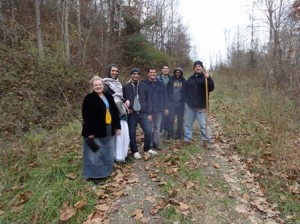
Board members and N.V. well-wishers return from hiking the trail to the original Vrindaban farmhouse.
Minutes of the Semi-Annual Meeting of the Joint Boards Of New Vrindaban
November 9, 2013
Day 2 of 3
ISKCON New Vrindaban (INV) Vision Statement: Founded in 1968, Srila Prabhupada boldly envisions New Vrindaban as a sacred place known worldwide for Cow Protection, Self-Sufficiency, Holy Pilgrimage, Spiritual Education, and, above all, Loving Krishna.
ECO-Vrindaban Mission Statement: ECOV (Earth, Cows, Opportunities & Vrindaban Villages) is dedicated to cow protection, sustainable agriculture, self-sufficiency and simple living — all centered around loving service to Sri Krishna, as envisioned by the ISKCON New Vrindaban Founder-Acharya, His Divine Grace A.C. Bhaktivedanta Swami Prabhupada.
INV Board Members: Gopisa, Ranaka, Dayavira, Chaitanya Mangala, Jaya Krsna, Tamohara
ECOV Board Members: Chaitanya Mangala, Madhava Gosh, Ranaka, Navin Shyam, Anuttama, Kripamaya
GBC: Malati, Anuttama, Tamohara
Recording Secretary: Laxmi Honest
Guests: Bhima Walker, Keval Patel
The meeting began at 10:00 with a walking tour of Bahulaban, Srila Prabhupada’s Palace and Old Vrindaban.
Dayavira mentioned that he and Ranaka had toured the Valley Barn area. He was impressed with the neat appearance of the area and the silos ready for bulk grain. Ranaka reported that they will be getting a grinder to make flour. The brick factory is in the process of being cleared and organized. It was agreed that we would add a visit to the Valley Barn to the next Community Tour in March/April 2014.
Chaitanya Mangala then introduced the guest candidates.
Bhima Walker lived in the community from 1980-1988. He was an ashram student and has been a regular visitor since that time. He spent 13 years full time in the military and is still a part time member of the Air National Guard. He is studying for his PHD in electrical engineering at Dartmouth College and has done Kulimela related volunteer service projects here in NV, and in Los Angeles, Australia and New Zealand. He is very interested in voluntarily serving as a board member in New Vrindaban where he thinks he can make a substantial contribution to the long-term progress of the community.
Keval Patel lived in the community from 1983-1996. He was also an ashram student in the 1980’s. He graduated from WVU in 2010 and is currently employed by JP Morgan Chase in Philadelphia. His parents live in the community. He feels that New Vrindaban is his home and it is important for him to give back to the community.
Both devotees are being considered as potential candidates for members of the board(s).
Chaitanya Mangala explained that qualities needed for board membership include strong personal character, deep roots in New Vrindaban and a clear history of volunteerism. It was noted that a sense of humor is also vital.
Deconstruction of the Bahulaban barn was discussed. The plan to dismantle the building sometime in 2014 remains the same. It was reconfirmed that we will recycle or repurpose as much of the building materials as possible.
The disposition of the Bahulaban utility building still remains unanswered. It was decided to get a quote on temporary roof repairs and it was noted that ECOV had previously agreed to spend up to $5,000 on temporary repairs.
Jaya Krsna next made a presentation about an eco-village proposal for the Old Vrindaban property. HH Bhakti Raghava Swami has suggested a model of a rural community be built there based on the principle of simple living and high thinking. It was agreed that we do want an eco-village, and this is a good discussion, but more details are needed before making any firm decisions.
The next item was a report on Srila Prabhupada’s Palace restoration. Jaya Krsna stated that repairs to the front steps are in progress and the balance of funds from that project will be used to put a roof on the walls of the old ghee factory building. The original molds are being returned and we need a place to store them. He also reported that there are plans to hire a project manager. It was agreed that projects already funded and in progress will go on with or without a project manager.
Next there was a discussion about the future of the Garden of 7 Gates. Jaya Krsna requested that ECOV take responsibility for managing food production. It was generally agreed that ECOV will oversee the gardens and INV will purchase the produce. Jaya Krsna suggested that ECOV develop plans to discuss with INV. It was agreed that this will go on the agenda for the next ECOV board meeting in December.
A plan was set for presentations at the Community Dialog, scheduled for the final day of the meetings. It was agreed Anuttama would lead and that department heads would review their reports of 2013 accomplishments, the settlement with Tapahpunja prabhu would be explained, Jaya Krsna would highlight the five primary instructions from Srila Prabhupada regarding New Vrindaban and Chaitanya Mangala would discuss the ECOV integrated auxiliary transformation. The Community Dialog would then be opened up for questions and discussion.
 As the world joins the South African nation in mourning the death of anti-apartheid struggle hero and South Africa’s first democratically elected State President, Nelson R. Mandela, devotees of ISKCON in South African cherish the wonderful memories of his visits to the Sri Sri Radha Radhanatha Temple and a Food For Life festival hosted by them as well as recount ISKCON’s journey through apartheid and into democracy Read more ›
As the world joins the South African nation in mourning the death of anti-apartheid struggle hero and South Africa’s first democratically elected State President, Nelson R. Mandela, devotees of ISKCON in South African cherish the wonderful memories of his visits to the Sri Sri Radha Radhanatha Temple and a Food For Life festival hosted by them as well as recount ISKCON’s journey through apartheid and into democracy Read more ›  As the world joins the South African nation in mourning the death of anti-apartheid struggle hero and South Africa’s first democratically elected State President, Nelson R. Mandela, devotees of ISKCON in South African cherish the wonderful memories of his visits to the Sri Sri Radha Radhanatha Temple and a Food For Life festival hosted by them as well as recount ISKCON’s journey through apartheid and into democracy Read more ›
As the world joins the South African nation in mourning the death of anti-apartheid struggle hero and South Africa’s first democratically elected State President, Nelson R. Mandela, devotees of ISKCON in South African cherish the wonderful memories of his visits to the Sri Sri Radha Radhanatha Temple and a Food For Life festival hosted by them as well as recount ISKCON’s journey through apartheid and into democracy Read more ›  The Grand Opening and Ribbon Cutting of ISKCON Brampton, on George Street, took place with great energy and enthusiasm recently. The ISKCON Vedic Cultural Learning Centre joins a community of over 350 centres worldwide, for the express purpose of making Vedic teachings more accessible to the people. Visitors to the open house enjoyed a free vegetarian feast, performances from local bands, a play about Vedic history and Odissi dancing. ISKCON is the International Society for Krishna Consciousness and visitors to the Brampton Centre will find a variety of class offerings including Yoga, Vegetarian cooking, dance lessons, scripture study and much more. Additionally, the Centre will be open to the public on Sundays for a vegetarian feast
The Grand Opening and Ribbon Cutting of ISKCON Brampton, on George Street, took place with great energy and enthusiasm recently. The ISKCON Vedic Cultural Learning Centre joins a community of over 350 centres worldwide, for the express purpose of making Vedic teachings more accessible to the people. Visitors to the open house enjoyed a free vegetarian feast, performances from local bands, a play about Vedic history and Odissi dancing. ISKCON is the International Society for Krishna Consciousness and visitors to the Brampton Centre will find a variety of class offerings including Yoga, Vegetarian cooking, dance lessons, scripture study and much more. Additionally, the Centre will be open to the public on Sundays for a vegetarian feast 
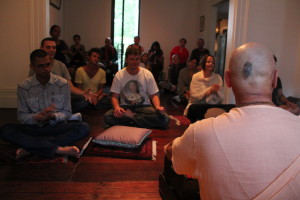
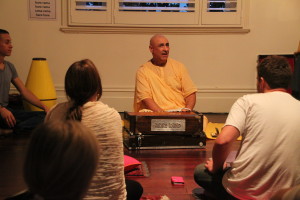
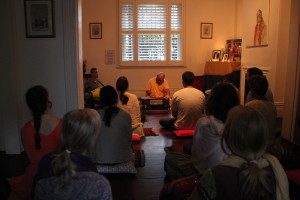
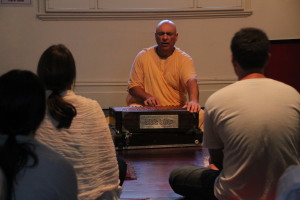




 Wonderful Abode, wonderful residents!
Wonderful Abode, wonderful residents!  As many devotees in our Toronto Hare Krishna community know, our temple restaurant, Govinda's, has been going through a dynamic overhaul over the last few years. The ambiance and atmosphere in the hall has been transformed, careful thought is now being put into our menus, and the public is responding by coming in great numbers!
As many devotees in our Toronto Hare Krishna community know, our temple restaurant, Govinda's, has been going through a dynamic overhaul over the last few years. The ambiance and atmosphere in the hall has been transformed, careful thought is now being put into our menus, and the public is responding by coming in great numbers! 
 2013-12-05, with Sivarama Swami
2013-12-05, with Sivarama Swami  The ancient teachings of Krsna consciousness (bhakti-yoga) provide insights about reincarnation and they offer us an opportunity to understand our material circumstances more deeply, and those teachings answer questions that might otherwise yield no suitable answers Check out this neat video below!
The ancient teachings of Krsna consciousness (bhakti-yoga) provide insights about reincarnation and they offer us an opportunity to understand our material circumstances more deeply, and those teachings answer questions that might otherwise yield no suitable answers Check out this neat video below!  I saw many devotees dressed in white kurtas and dhotis and were busy with their prayers. It was a pleasant atmosphere and all of us spend a few minutes in front of the beautiful idol and experienced the peace being there. I was keen to know more about the activities. I walked up to a person in the temple counter and he directed me to the office where a middle-aged person gave an entire picture of the various activities. It included cow protection, school for children, annadhanam and many more. A wonderful organization with humble and noble activities! I felt proud of them!
I saw many devotees dressed in white kurtas and dhotis and were busy with their prayers. It was a pleasant atmosphere and all of us spend a few minutes in front of the beautiful idol and experienced the peace being there. I was keen to know more about the activities. I walked up to a person in the temple counter and he directed me to the office where a middle-aged person gave an entire picture of the various activities. It included cow protection, school for children, annadhanam and many more. A wonderful organization with humble and noble activities! I felt proud of them!  Throwback Thursday is a weekly theme commemorating vintage moments. Let’s see who knows their New Vrindaban history.
Extra credit for anyone who can correctly name the cows as well!
Throwback Thursday is a weekly theme commemorating vintage moments. Let’s see who knows their New Vrindaban history.
Extra credit for anyone who can correctly name the cows as well!  Fulfilling Srila Prabhupada's desire for Iskcon Moscow
Fulfilling Srila Prabhupada's desire for Iskcon Moscow  As the dialogue by which Crown Prince Rama becomes Sri Rama - it seemed like a fitting choice for a future King, and Prince William was most appreciative of the gift. After conversing regarding its context, His Highness expressed his gratitude and said that he would read it to his son, Prince George
As the dialogue by which Crown Prince Rama becomes Sri Rama - it seemed like a fitting choice for a future King, and Prince William was most appreciative of the gift. After conversing regarding its context, His Highness expressed his gratitude and said that he would read it to his son, Prince George 